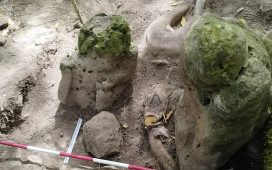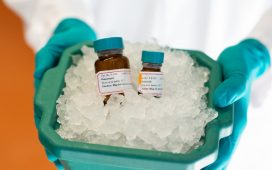Dire wolves – long extinct and made famous by Game of Thrones – have been brought back to life more than 10,000 years after disappearing from the face of the Earth. Three dire wolf pups have been successfully cloned using gene-editing and ancient DNA – a breakthrough it described as a “massive milestone” in the emerging field of de-extinction.
Texas company Colossal Biosciences said on Monday its researchers had used cloning and gene-editing based on two ancient samples of dire wolf DNA to birth three modern dire wolf pups – two six-month-old males named Romulus and Remus and a three-month-old female named Khaleesi. Colossal’s chief executive Ben Lamm called the development a “massive milestone”. He said in a statement: “I could not be more proud of the team. This massive milestone is the first of many coming examples demonstrating that our end-to-end de-extinction technology stack works.
“Our team took DNA from a 13,000-year-old tooth and a 72,000-year-old skull and made healthy dire wolf puppies.
“It was once said, ‘any sufficiently advanced technology is indistinguishable from magic’. Today, our team gets to unveil some of the magic they are working on and its broader impact on conservation.”
Researchers at Colossal explained the de-extinction process involved taking blood cells from a living grey wolf – the dire wolf’s closest living relative – and genetically modifying them in 20 different sites.
That genetic material was transferred to an egg cell from a domestic dog, then the embryos were transferred to surrogates for gestation and, finally, successful birth.
The dire wolf is a mainstay of fantasy settings in pop culture, with mentions in role-playing games like Dungeons & Dragons and video games like World of Warcraft.
However, the vehicle which truly shot dire wolves to fame is the HBO series Game of Thrones, based on the works of author George RR Martin.
Mr Martin, an investor in Colossal and cultural adviser for the company, said: “Many people view dire wolves as mythical creatures that only exist in a fantasy world, but in reality, they have a rich history of contributing to the American ecosystem.”
“I get the luxury to write about magic, but Ben and Colossal have created magic by bringing these majestic beasts back to our world.”
Colossal also announced it had cloned four red wolves using blood drawn from wild wolves of the southeastern US’ critically endangered red wolf population.
The aim is to increase the genetic diversity of the small population of captive red wolves that scientists are using to breed and help save the species. Speaking to Express.co.uk last year, Colossal’s co-founder and CEO, Mr Lamm, said the project had been years in the making.
He said: “It’s one of the most exciting and technically complicated things we’ve ever done. These are not just theoretical animals anymore — they’re living, breathing pups. And this is just the beginning.”
Colossal’s chief animal officer Mike Goodwin also said the pups were “thriving”.
He said: “They’re strong, social, and they exhibit exactly the kind of behavioural traits we were hoping for — curious, confident and pack-oriented.
“We’re keeping them in a highly controlled environment and monitoring their development closely. So far, all signs are positive.”
Mr Lamm added: “People have been dreaming about bringing extinct species back for decades. Now we’ve done it — and with one of the most iconic predators of the Ice Age.”










